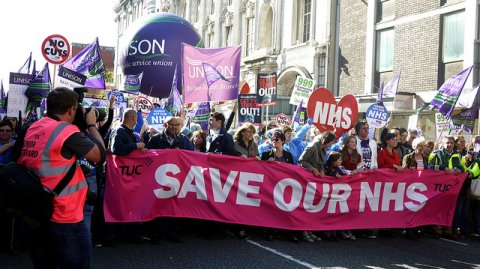
18 November 2014
Our advisor Matt Dykes explains why MPs need to Back the Bill to save our NHS. This blog was first published by Touchstone.
Another day brings us yet another worrying example of the private take-over of NHS services. David Cameron’s dismissal of privatisation fears as “nonsense” is becoming increasingly untenable.
A report from the Health Service Journal (£) shows that East Staffordshire Clinical Commissioning Group (CCG) has short-listed two private companies for a £280m contract to run services for older people in a competition that has squeezed out all NHS bidders.
It is this intensifying privatisation across the NHS that has led the TUC and unions across the NHS to call for support for the NHS (Amended Duties and Powers) Bill, promoted by Clive Efford MP, which gets its second reading in the House of Commons this Friday (21 November). The Bill aims to remove the enforced competition within the NHS brought into play by the government’s Health and Social Care Act and threatened further by the potential TTIP trade agreement.
The Improving Lives programme, which provides support to 6,000 older people suffering from long-term conditions such as diabetes and heart disease, will now be run by either Virgin or Optum, part of the US corporation United Health. Both companies also remain in the running for the controversial contracts for cancer and end of life care in Staffordshire.
The contract will be operated through a Prime Provider model, as seen on the Work Programme and in the newly privatised probation service, where the winning contractor will be responsible for managing the integration of the service across a range of other providers, sub-letting contracts and managing the supply chain. Helping them do this will be the, by then, independent Midlands and Lancashire Commissioning Support Unit.
In effect, the whole of the commissioning of this ‘service pathway’ will have been passed to the private sector. When asked why the CCG itself could not do the integration itself, the East Staffordshire CCG spokesperson said:
The CCG can’t do that partly because we don’t have the capacity. What we are talking about is supply chain management CCGs were not set up in scale or expectation to micro manage the interactions between different providers
In other words, the government’s top down reorganisation of the NHS has handed over whole service areas not only to be provided but also to be managed by the private sector.
The CCG say that it is likely that whoever wins the contract will choose to commission services with NHS providers, such as the local acute hospital, but it fully admits that it has no power to make this happen. And while this may be the case in the short-run, the prime provider model has the potential to significantly change the landscape of service provision over time, with the NHS commissioners having little control over that process.
To give an idea of what that might mean, a quick look at the prime provider model used in the Work Programme is instructive. Research by the Centre of Economic and Social Inclusion shows that 70 per cent of job seekers going through the programme receive front-line services from private firms, mostly through the prime contractors themselves, with 18 per cent seen by voluntary organisations and just 8.5 per cent by public sector bodies.
There is no reason why the same kind of distribution of front line services won’t, in time, begin to take shape across the health service in England as the prime provider model becomes increasingly used and the role of independent commissioning support units becomes entrenched. So much for local people and GPs being in charge of shaping local services.
And this is why Clive Efford’s Bill is so significant. It provides an opportunity for MPs of all parties to put a break on a process that this government has driven through in the face of overwhelming opposition for all who work in and rely on the NHS.

Photo used under Creative Commons licensing, thanks to Sheila.

Add new comment